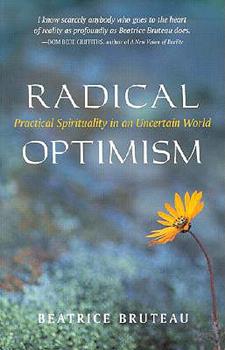My father died two months ago. Out of my sad longing to connect with him, to be in his presence again, I’ve paid particular attention to my dreams. They’ve been disappointingly mundane. Here’s one: Emily and I and another couple spontaneously decide to see a movie. I enter the theater to learn our options—a silly animated family flick and an indie I don’t recognize called “Optimism.” The others are excited to see “Optimism.” They’ve heard great things. I worry that a 8:10 start time will be too late for the kids.
I just finished reading a book called Radical Optimism, so it’s no mystery where the dream movie originated. Beatrice Bruteau was a brilliant scholar who integrated the studies of science, mathematics, philosophy, religion, and spirituality; I read a book of hers every year for a dose of perspective. Radical Optimism satisfied. Bruteau posits that optimism is the “first and ineluctable step” toward demonstrating what is held by the belief within that optimism. “Filling your mind, your imagination, your emotions, with the belief that you can do the good you intend is the most powerful help you can bring to bear on actual accomplishment.”
Reading these words I was blown away by Bruteau’s courage. A territory most academics would shun as wishful thinking she delves into, delineating how, exactly, belief functions in our lives. Even the simplest among us know that people with positive attitudes are more fun to be around, that students rise to high expectations and that negative self-talk can be deadly. Yet we pussy-foot around faith because it’s delusional, a systematized form of wishful thinking.
Bruteau is too astute to equate “wishing” with “willing.”
Our interior disposition should be a firm will that justice be done and that the situation be changed as soon as possible–and we should take all the actual concrete steps to do this– but at the same time, we need not indulge in wishing that things were, at any given moment, other than as they are. … Wishing acknowledges the expected continuation of the undesired situation. It admits that we believe we cannot change it. … Willing, on the other hand, is the first step in actually changing the situation.
To will an unjust situation otherwise, we have to believe it can be otherwise. Bruteau’s optimism is radical; it’s grounded in “the root of our being, securely held in the Absolute Being.” It is pragmatic because the belief then creates our reality.
My father was an undying optimist. Despite teaching the grandkids to say, “The system is corrupt!”, despite his ability to recognize history repeating itself, despite his fury over the rise of populism and the corruption of our country’s courts, he believed in people’s goodness, especially on the local, organizational level. Toward the end he also engaged in wishful thinking; just weeks before he died he told me he had a few more years left in him. In hindsight it’s easy to see how different his wishing was from his willing, for which he worked relentlessly and which after his death was evident in the breadth of his community’s love. He exercised a pragmatic faith and left the world a better place because of it.
Much as I wish to see my dad again, I’m choosing to live as though he’s still very much with us, because his kind of presence is what our world needs. And that’s the kind of movie the kids should stay up late to see.
–Elizabeth Jarrett Andrew
